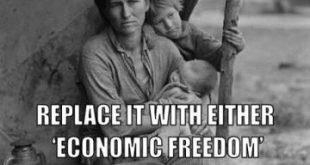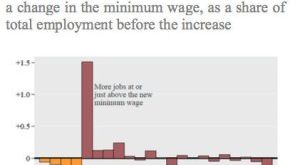So what do I mean by methodological arrogance? I mean an attitude that invokes micro-foundations as a methodological principle — philosophical reductionism in Popper’s terminology — while dismissing non-microfounded macromodels as unscientific. To be sure, the progress of science may enable us to reformulate (and perhaps improve) explanations of certain higher-level phenomena by expressing those relationships in terms of lower-level concepts. That is what Popper calls...
Read More »Die Starökonomin Stephanie Kelton im Interview
Die Starökonomin Stephanie Kelton im Interview Wenn die USA stattdessen eine Schuldenbremse beachtet, den Haushalt konsolidiert und das Defizit reduziert hätten, würden Millionen von Amerikanern, die heute einen Job haben, nicht arbeiten. Das reale Bruttoinlandprodukt würde schrumpfen, ebenso das Wachstum. Wir würden Einkommen, Vermögen, Beschäftigung opfern. Wieso sollten wir das tun? Um Spielraum zu schaffen? Viele Leute fordern tatsächlich, das Pulver...
Read More »Cherry-picking economic models
How would you react if a renowned physicist, say, Richard Feynman, was telling you that sometimes force is proportional to acceleration and at other times it is proportional to acceleration squared? I guess you would be unimpressed. But actually, what most mainstream economists do amounts to the same strange thing when it comes to theory development and model modification. In mainstream economic theory, preferences are standardly expressed in the form of a utility function....
Read More »IPA’s weekly links
WHO measles surveillance dataGuest post by Jeff Mosenkis of Innovations for Poverty Action Thanks for being patient while the links were sleeping, expect some summer disruptions of schedule as wellMeasles cases are up 300% over last year with outbreaks in the U.S., Europe, The Philippines, Myanmar, and several African countries. I heard a PSA that adults vaccinated before a certain period (when the vaccine process changed) might no longer be immune. So I got checked and sure enough I wasn’t,...
Read More »D. McCloskey’s own shallow and misleading rhetoric
D. McCloskey’s own shallow and misleading rhetoric This is not new to most of you of course. You are already steeped in McCloskey’s Rhetoric. Or you ought to be. After all economists are simply telling stories about the economy. Sometimes we are taken in. Sometimes we are not. Unfortunately McCloskey herself gets a little too caught up in her stories. As in her explanation as to how she can be both a feminist and a free market economist: “The market is the...
Read More »An interview with Tom Sargent
An interview with Tom Sargent [embedded content] I especially love the way this Nobel laureate “explains” rational explanations: There are so many people out there, and it is so difficult to know how each one of them thinks about the future. So let’s just assume they think the same. Problem solved. And that absolute nonsense reasoning rendered this guy a ‘Nobel prize’ in economics! The tiny little problem that there is no hard empirical evidence that...
Read More »The Effect of Minimum Wages on Low-Wage Jobs
The Effect of Minimum Wages on Low-Wage Jobs The figure shows the effect of an average minimum wage increase on the wage distribution at each wage level relative to the minimum wage. Minimum wage increases led to a clear reduction in jobs below the new minimum wage, confirming that the minimum wages we study are binding. The reduction in jobs paying below the minimum was balanced by a sharp increase in the number of jobs paying at the new minimum, along...
Read More »Emmanuel Macron: un retour aux vieilles recettes keynésiennes?
Emmanuel Macron: un retour aux vieilles recettes keynésiennes? La dette publique française a augmenté de près de 40 points de PIB depuis le début de la crise en 2008. Elle est stabilisée depuis quelques trimestres, alors que l’Allemagne est parvenue à la faire baisser significativement depuis 2012. Une relance de l’activité par une recette keynésienne va se traduire par une hausse de la dette publique par rapport au scénario sans relance. Ce qui sauve le...
Read More »Cos’è la MMT?
MMT è due cose: è una lente di osservazione dei processi di creazione e circolazione del denaro, ed è una ricetta per la piena occupazione e la stabilità dei prezzi. Quanto alla prima, i contributi migliori di MMT sono quelli che, sviscerando i nessi tecnici tra banca centrale, banche e Tesoro, dimostrano che il denaro a disposizione della spesa pubblica proviene sempre, inevitabilmente, dalla banca centrale, e che la differenza tra finanziamento sul mercato e monetizzazione...
Read More »Entretien avec Stephanie Kelton dans Le Monde
Entretien avec Stephanie Kelton dans Le Monde Stephanie Kelton propose une nouvelle étape : le droit à l’emploi pour tout travailleur, financé par l’Etat fédéral et administré au niveau local, avec une couverture sociale. Ce programme antipauvreté, qui emploierait quinze millions de personnes, coûterait 400 milliards de dollars par an, mais il entraînerait, selon elle, une hausse du PIB de 560 milliards et créerait quatre millions d’emplois privés. On lui...
Read More » Heterodox
Heterodox









